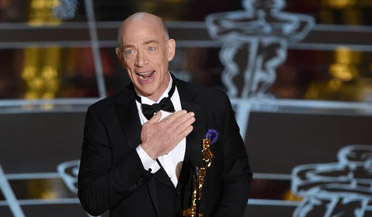|
|
They Shoot Oscar Prognosticators, Don’t They?Birdman Triumphs at Politicized OscarsBy J. Don BirnamFebruary 23, 2015
Whiplash won Editing and Sound Mixing - as I can say I proudly predicted weeks ago before it became the consensus pick - to shore up its deserving win for Best Supporting Actor. Selma took home Best Original Song, American Sniper won Best Sound Editing, The Imitation Game won Best Adapted Screenplay, and The Theory of Everything and Boyhood took home acting prizes. So they spread the wealth as most expected. Alexandre Desplat finally has an Oscar, after winning for the score of The Grand Budapest Hotel, and so does Julianne Moore. Those were my highlights of the night. The big story has to be that the speeches this year were more political than usual. Patricia Arquette began it by calling for equal pay for women, which led to standing ovations from Meryl Streep and Jennifer Lopez in a strange but touching moment. Common spoke about incarceration rates and discrimination against African-Americans when he accepted the Oscar for “Glory,” and the screenwriter for the Imitation Game spoke of the difficulties of growing up as a gay individual. Julianne Moore spoke of Alzheimer’s, and Eddie Redmayne spoke of ALS disease. And, not surprisingly, Laura Poitras spoke about government spying when she took the stage to accept the Oscar for CITIZENFOUR.
|

|
|
|

|
Thursday, October 31, 2024
© 2024 Box Office Prophets, a division of One Of Us, Inc.


